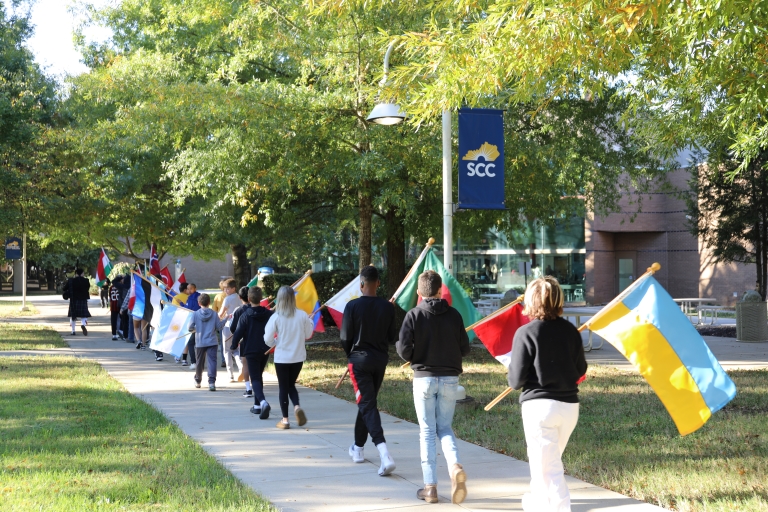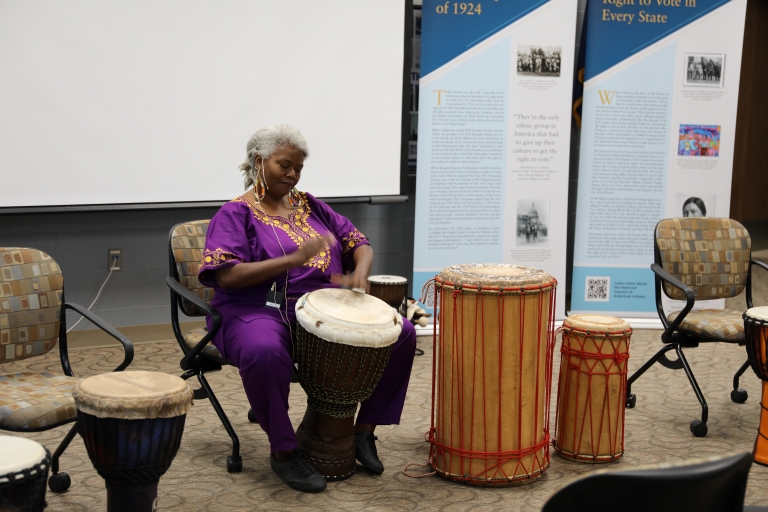
Access, Engagement, and Belonging
What Are We Trying to Accomplish?
 The Office for Access, Engagement, and Belonging was established in July 2005 to plan
and implement a comprehensive program that promotes diversity in the College. Our
annual International Festival is just one example of this effort.
The Office for Access, Engagement, and Belonging was established in July 2005 to plan
and implement a comprehensive program that promotes diversity in the College. Our
annual International Festival is just one example of this effort.
What is Diversity?
The recognition and understanding of the similarities and differences between ourselves and other people based on race, religion, gender, sexual orientation, ethnicity, and/or nationality. (Approved by the KCTCS Faculty Council, Spring 2006)
Why is This Important?
 As an educational institution that provides life-long learning opportunities, Somerset
Community College through the Office of Access, Engagement, and Belonging seeks to:
As an educational institution that provides life-long learning opportunities, Somerset
Community College through the Office of Access, Engagement, and Belonging seeks to:
- Improve access and success of underrepresented students in higher education;
- Redress current underrepresentation of minority faculty, staff and administrators;
- Prepare all students to work in a global, multicultural society; and
- Lead the larger community to embrace diversity, which can spur innovation and creativity, both of which are important economic drivers.
What are the Proposed Objectives?

- To assist with the recruitment and retention of a diverse student population
- To assist with the recruitment of a diverse workforce at all levels (administrators, staff and faculty) of the college;
- To develop and provide cultural diversity training for all college employees
- To seek expansion and transformation of the curriculum to address diversity issues (i.e. experiential learning, immersion and exchange programs, multicultural course work, etc); and
- To raise awareness and appreciation of diverse people and their cultures by sponsoring special events and activities.
SCC supports the opportunity to bring people together and help towards improving relations that have been so harmful to minorities and our country. As an institution of higher education, we believe a part of our mission is to ensure students, graduates, and employees are aware of these societal issues and possess the information that will help make positive change. We also want to help wherever possible to bring students, employees, and community together. Diversity, equity, and inclusion are a part of our culture, not a side bar or initiative.
SCC:
- Understands that diversity, equity, and inclusion (DEI) impact our community, region, state, nation, and the world.
- Strives to educate and inform students, graduates, employees, and the community with information to improve DEI.
- Utilizes our DEI plan that includes underrepresented minorities, equal opportunity planning for employees and students, and community planning toward success strategies and goals.
- Does not endorse planning or actions supporting DEI that advocate violence or illegal acts.
- Does not endorse planning that opposes DEI among students, employees, and communities.
SCC plans include:
- Review and revise SCC policies, procedures, and instruction for inclusiveness and equity.
- Review and revise curriculum to support inclusiveness and equity.
- Additional support and education of DEI through professional development.
- Provide opportunities for employees and students to collectively discuss DEI current issues in our college and community.
- Provide avenues to address DEI areas of concern at SCC through planning and actions.
- Provide venues to the communities we serve to that promote, discuss, and work for positive change in diversity, equity, and inclusion.
- Development of increased opportunities for all SCC locations.
SCC will continue to support and implement these actions through all areas across our institution but focused through the Diversity, Equity, and Inclusion Committee.
Diversity Action Plan Highlights
Somerset Community College acknowledges the immeasurable benefits derived from having a diverse student body, including promoting cross-racial understanding, breaking down racial stereotypes, promoting spirited and energetic classroom discussion, and much more. Through its strategic planning process, SCC set goals of increasing recruitment and retention, specifically as related to underrepresented minority (URM) and low-income populations.
In total, SCC serves 5,776 students from 108 Kentucky counties and several out-of-state areas. More than 90% of our students receive some type of financial aid and our minority population is 7.7% of overall enrollment (unofficial Fall 2023 data).
From its inception, SCC has focused on providing a welcoming atmosphere for people of all races, colors, creeds, backgrounds, and orientations. The college frequently brings cultural programs to the campus for enrolled students, as well as visiting students and community members. These programs focus on, and give forum to, thoughts about diversity, equity and inclusion.
Expanding the minority program offered at SCC, recruiting a more varied student population, and continuing to provide the college and community with programs and activities that foster diversity are of upmost importance.
This diversity plan includes data on SCC as a whole and takes a closer look at specific URM groups on campus. In addition, areas of improvement have been identified through qualitative and quantitative surveys and existing data provided by the SCC OIER. Based on data, the following identified goals can strengthen and improve campus diversity recruitment (opportunity), retention (success) and campus climate (impact).
Diversity Planning Process
The SCC Leadership Team and Diversity Committee identified goals for the College through a lengthy and detailed process. In 2016, a survey was distributed to all students, staff, and faculty to gauge interest and awareness of diversity-related issues on campus. In 2017, conversational interviews of internal and external stakeholders began. The SCC Campus Diversity Initiatives Team, the SCC Multicultural Club, and the SCC Diversity Assessment Team began a comprehensive process to survey all entities that have an interest in campus diversity. The overarching belief that guided the process was that all students can learn and all stakeholders should be a part of the planning process.
To begin, all SCC students, faculty, and staff received an electronic survey that consisted of open-ended questions requiring written responses for each. Two hundred forty-seven individuals responded to the survey. The Office of Institutional Effectiveness and Research (OIER) staff compiled all responses, and distributed the results to members of the Diversity Assessment Team, the SCC Somerset Multicultural Club, and members of the SCC Leadership Team.
In addition to the campus survey, the College also engaged in a qualitative analysis process that utilized members of all three groups, as well as others interested in being a part of the process. The groups interviewed students, faculty and staff, members of the President’s Leadership Team, members of the SCC Boards, and members of the various communities. The College used separate interview instruments for each group. Interviewers submitted all interview results to the OIER staff for compilation. The contents and recommendations from College stakeholders provided the framework for the development of the SCC Diversity Plan. (See Attachment 1 for a chart outlining those who conducted consultations and the population groups they interviewed.)
During the survey process, feedback was solicited on a variety of topics, including:
- Hispanic population
- General diversity recommendations
- Cultural diversity
- Core competencies in place
- Low-income students
- Gender issues, and
- Disabilities
Valuable advice was provided in all areas, with suggestions ranging from removing language barriers in the classroom to providing increased assistance in searching for minority-related scholarships, and hosting workshops to provide a better understanding of gender diversity. (See Attachment 2, found at the end of this document, for a sampling of suggestions by category as taken directly from survey results.)
From the qualitative and quantitative survey results, as well as existing data provided by the SCC OIER, several areas of concentration were identified. SCC will focus on the following areas to strengthen and improve campus diversity recruitment and enrollment (opportunity), student success (success) and campus climate, inclusiveness, and cultural competency (impact). Each goal is outlined below with specific strategies and measures.
- Opportunity
- Success
- Impact
Data revealed significant opportunity for growth in the recruitment and enrollment of underrepresented minorities including Black/African-American, Hispanic, and other student categories.
Opportunity Strategy 1: Increase number of minority scholarships specifically available to SCC students from one to two by specifically soliciting local business owners and managers who hire Hispanic-speaking individuals for scholarship funds.
Opportunity Strategy 2: Expand minority recruitment events by increasing the number of Super Someday college recruitment event locations.
Success Strategy 1: Lessen language barriers on campus by offering English as a Second Language (ESL) opportunities on campus.
Success Strategy 2: Provide ongoing Early Alert Services for URM and low-income students to improve retention/persistence.
Success Strategy 3: Improve retention through existing student services and develop additional innovative programs.
Success Strategy 4: Take steps toward making the campus more “student friendly” and provide opportunities for student engagement and involvement while providing easy access to information that may affect retention.
SCC focuses on recruiting, hiring, and retaining a diverse, qualified workforce by targeting minority recruitment through posting open positions in minority and other publications with national and global readership. Some of the publications used to recruit for faculty and professional staff positions include The Chronicle of Higher Education, The Journal of Blacks in Higher Education, and Inside Higher Ed. Additionally, all regular full-time faculty and staff positions are posted on the SCC and KCTCS website. Such allows applicants to apply online without having to come to campus, which in turn, expands the College’s reach outside of the region.
Impact Strategy 1: Increase workforce diversity by expanding recruitment efforts.
Impact Strategy 2: Promote the benefits and value of diversity and increase cultural competency
The SCC Diversity Action Plan will include the following for its Plan for Assessment:
1st to 2nd Year Retention – URM
- Increase URM retention rate by at least 1.0 percentage point each year.
- The Office of Access, Engagement, and Belonging in conjunction with Student Services will review data provided to analyze student successes. Alterations will be made to improve strategies should this become necessary.
Super Someday
- Response cards will be entered into the Radius program and regularly monitored to determine enrollment into SCC classes.
- Follow-up will continue until enrollment has been actualized.
Governor’s Minority Student College Preparation Program
- GMSCPP graduates will be encouraged to participate in local Upward Bound programs and monitoring these students will determine their enrollment in SCC classes.
Recruitment Fairs
- Response cards will be entered into the Radius program and regularly monitored to determine enrollment in SCC classes.
Workforce Diversity
- A minimum of five new outreach and recruitment methods will be added to existing methods.
Who Should Be Involved?
Student, staff, and faculty VOLUNTEERS from across the campuses and centers, as well as community representatives are needed! Please call or come by the Office for Access, Engagement, and Belonging if you would like to get involved. We also have a Multicultural Club at both Somerset and Laurel Campuses. Join the Multicultural Club to help with cultural diversity initiatives within the college and community.
Where is the Office of Access, Engagement, and Belonging Located?
The main office is located in Meece Hall in Room 105, Somerset Campus North.
Still Have Questions?
Request the full Diversity Plan report by contacting Elaine Wilson, Director of Access, Engagement, and Belonging by email at elaine.wilson@kctcs.edu or by phone at (606) 451-6915.
